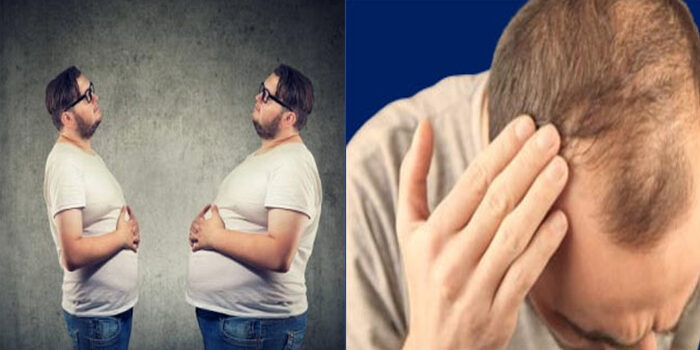Losing weight is a challenge faced by many people. It can be difficult to manage your diet and exercise regimen, and even more so when the results are not seen right away. However, there can be side effects to drastic or even healthy weight loss that you may not have anticipated: hair loss. It’s important to understand and address the root causes of this issue to prevent it from becoming a serious problem. In this blog post, we will explore the relationship between weight loss and hair loss, as well as some tips you can use to protect your hair during your journey of weight loss.
Contents
What Is Weight Loss?

Weight loss is one of the most common goals that people have in their lives. It can be achieved by reducing calorie intake, exercising more frequently, and making healthier food choices. While weight loss is a great way to improve your health overall, it can also lead to hair loss if not done safely and properly monitored.
Weight loss is an important factor in maintaining overall body health. When you lose weight, the body has to adjust to a new normal and this can cause stress on both your physical and mental health. This kind of stress can lead to hair loss as well. It is important that when you are trying to lose weight, you should do it slowly and safely so that your body can adjust to the new changes without causing too much stress.
What Is Hair Loss?

Hair loss can be treated in a variety of ways, depending on the cause. If the cause is related to medical conditions such as alopecia areata, thyroid disease, lupus, or anemia, treatment may include medications to address these underlying issues. Minoxidil (Rogaine) and finasteride (Propecia) are two medications commonly prescribed for hair loss. Other treatments can include corticosteroid injections into bald patches, PRP therapy (platelet-rich plasma), laser therapy, and surgery.
Hair loss therapy can be tailored to each individual, depending on the cause. Natural remedies for hair loss can include lifestyle modifications such as changing diet, reducing stress, and avoiding certain hairstyles that may be causing traction alopecia. It is important to talk to your doctor or a hair specialist if you are experiencing excessive hair loss that natural causes cannot explain. Together they can create a plan of action to help address the issue in the most effective way possible.
Medication will likely be prescribed if there are medical issues causing hair loss. This could involve taking oral medications or receiving injections into balding areas. If desired, surgical options such as scalp reduction and flap surgery can also be considered; however, these treatments should only be used after careful consideration, as they are more invasive and may have long-term side effects.
Relationship Between Weight Loss and Hair Loss
The relationship between weight loss and hair loss is complex. While being overweight or obese can contribute to hair loss, so can rapid weight loss. When a person rapidly loses weight, their body does not have time to adjust to the change in caloric intake. This sudden shift in energy reserves can put stress on the body’s systems, including the hair follicles.
When a person puts their body under too much stress during periods of rapid weight loss they may experience an increased rate of shedding. This type of temporary hair loss is known as Telogen Effluvium and usually occurs 3-5 months after a stressful event. Fortunately, this type of hair shedding is often reversible once the underlying cause has been addressed.
Also, the relationship between weight loss and hair loss can be affected by diet. Eating a balanced, nutrient-dense diet is essential for healthy hair growth. Hair follicles require certain vitamins and minerals to remain strong and healthy including protein, iron, zinc, and vitamin A. If a person is not getting enough of these nutrients in their diet, they are more likely to experience premature hair shedding or thinning due to inadequate nutrition.
Therefore it is important that if you are trying to lose weight it should be done safely and gradually while also ensuring that your body has all the necessary nutrients it needs to promote healthy hair growth. Additionally, speak with your doctor or healthcare provider about any nutritional deficiencies that may put you at risk for hair loss. Taking the proper steps to ensure that your diet is balanced and healthy can help minimize any potential hair loss associated with weight loss.
By taking a holistic approach to health and wellness, it’s possible to achieve successful weight loss without sacrificing your hair health in the process.
How To Prevent Weight Loss and Hair Loss?

There are many possible causes of weight loss and hair loss, so it is important to see a doctor to determine the cause. However, some general tips may help prevent both weight loss and hair loss.
Eat Healthy Diet
One of the most important things you can do to prevent both weight loss and hair loss is to eat a healthy diet. Eating a balanced diet that includes plenty of fruits, vegetables, lean proteins, whole grains, and healthy fats can help ensure your body gets all the nutrients it needs for optimal health. Some of these nutrients, such as biotin and zinc, are important for healthy hair growth.
The American Heart Association recommends that adults get at least 30 minutes of moderate-intensity physical activity 5 days a week. Exercise can help you maintain a healthy weight, which in turn may help reduce the risk of hair loss and other health conditions associated with being overweight or obese.
Reduce Stress
Stress is a major contributor to both weight loss and hair loss, so reducing your stress levels is important for preventing these issues. There are several lifestyle changes you can make to reduce stress, such as getting plenty of rest, managing time wisely, and engaging in activities that bring you joy. Additionally, relaxation techniques such as deep breathing, yoga, and meditation can all help lower stress levels.
Some medications can also cause weight loss and hair loss, so it is important to talk to your doctor about any possible side effects before starting a new medication. Additionally, if you are taking a medication that is causing these issues, ask your doctor about other options that may be available.
Get Adequate Nutrients
Ensuring that you get adequate amounts of vitamins and minerals in your diet is also important for preventing both weight loss and hair loss. Eating a varied, nutrient-rich diet can help ensure your body gets all the nutrients it needs to stay healthy. Additionally, taking a daily multivitamin may help fill any nutritional gaps in your diet.
Some of the most important nutrients for hair growth and healthy weight maintenance include biotin, zinc, vitamin D, iron, and omega-3 fatty acids. Eating foods that are rich in these nutrients can help ensure your body gets the nourishment it needs for optimal health.
Try to Avoid Crash Dieting
Crash dieting can lead to rapid weight loss, which can also cause hair loss. If you are trying to lose weight it is important to do so safely and healthily by making gradual changes to your lifestyle and diet. Additionally, crash diets may not provide your body with the nutrition it needs for optimal health, so it is important to focus on eating a balanced diet that includes plenty of fresh fruits and vegetables.
Make Sure You Have Enough Protein
Protein is an essential nutrient for both healthy hair and weight maintenance, so it is important to make sure you are getting enough in your diet. Eating plenty of lean proteins such as fish, poultry, eggs, beans, tofu, and nuts can help ensure your body gets the protein it needs for optimal health. Some of these foods are also rich in other essential nutrients such as omega-3 fatty acids, which can help promote healthy hair growth.
Have Regular Health Screenings
Finally, it is important to have regular health screenings to monitor your overall health. Regular checkups can help detect any underlying medical issues that may be contributing to weight loss and hair loss, so you can take the necessary steps to address them. Additionally, if you are having any symptoms of hair loss or weight loss, make sure to talk to your doctor about them as soon as possible.
By following these tips and taking steps to reduce stress and eat a healthy diet, you can help prevent both weight loss and hair loss. Additionally, if you are experiencing either of these issues it is important to talk to your doctor, as there may be underlying medical issues that need to be addressed.
Conclusion
Weight loss and hair loss can be related, with many people experiencing more hair fall while dieting or even after losing weight. While it is important to remember that the amount of hair loss should not be cause for alarm, there are several steps you can take to help protect your scalp and ensure healthier hair growth going forward. From supplementing your diet with essential nutrients like iron and zinc to avoiding harsh styling products, implementing these tips will help keep any potential damage from becoming permanent.
Consider contacting FitMantra for additional information on nutrition and fitness. You can also get in touch with their nutrition experts through our online nutrition counseling, who can guide you through the process and help you achieve your fitness goals. You can also lose weight with the help of our weight loss program. Download our Fitness app on Android to learn more about us.
